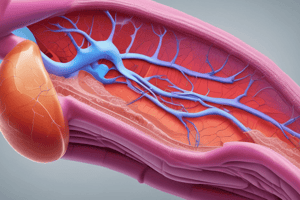Podcast
Questions and Answers
What is the most common type of nephritis found in pregnant women?
What is the most common type of nephritis found in pregnant women?
- Lupus nephritis (correct)
- Chronic nephritis
- Post-infectious nephritis
- Acute interstitial nephritis
Most nephritis cases in older adults are due to infections.
Most nephritis cases in older adults are due to infections.
False (B)
Name two common signs and symptoms of nephritis in children.
Name two common signs and symptoms of nephritis in children.
Weight gain from fluid retention and blood in urine.
The increase in pregnancy loss is more likely in pregnant women with ______ disease activity.
The increase in pregnancy loss is more likely in pregnant women with ______ disease activity.
Match the following patient groups with their nephritis characteristics:
Match the following patient groups with their nephritis characteristics:
What is a key component of nursing care for patients with glomerular disorders?
What is a key component of nursing care for patients with glomerular disorders?
Which symptom should the nurse monitor for in a patient with glomerular disorders?
Which symptom should the nurse monitor for in a patient with glomerular disorders?
Which of the following is NOT a potential nursing diagnosis for a patient with nephritis?
Which of the following is NOT a potential nursing diagnosis for a patient with nephritis?
Which goal is appropriate for a pediatric patient receiving nursing care for nephritis?
Which goal is appropriate for a pediatric patient receiving nursing care for nephritis?
What assessment should be included when evaluating a patient suspected of having nephritis?
What assessment should be included when evaluating a patient suspected of having nephritis?
Which factor may contribute to the potential for impaired skin integrity in nephritis patients?
Which factor may contribute to the potential for impaired skin integrity in nephritis patients?
What is the minimum urinary output goal for patients receiving nursing care for glomerular disorders?
What is the minimum urinary output goal for patients receiving nursing care for glomerular disorders?
Which of the following would be a common complaint from a patient with fluid volume excess?
Which of the following would be a common complaint from a patient with fluid volume excess?
Flashcards are hidden until you start studying
Study Notes
Nephritis in Children
- Several types of nephritis affect children, most are rare.
- Causes include immune issues, infections, and unknown origins.
- Symptoms range from mild to severe, including weight gain, fever, fatigue, blood in urine, and protein in urine.
- Early diagnosis is crucial for appropriate treatment.
Nephritis in Pregnant Women
- Lupus nephritis is the most common type in pregnant women.
- Preconception planning and SLE in remission for 6 months before pregnancy improve outcomes.
- Higher SLE activity increases pregnancy loss risk.
- Medications for lupus nephritis and SLE must be carefully chosen due to potential fetal harm.
Nephritis in Older Adults
- Acute interstitial nephritis is a significant cause of acute kidney injury, possibly increasing in prevalence among older adults.
- Medications, particularly PPIs and antibiotics, are the leading cause in older adults.
- Older adults have a higher risk of developing chronic kidney disease or end-stage renal disease compared to younger individuals.
- Mortality risk is elevated when the condition develops during hospitalization.
- Symptoms may be less noticeable in older adults.
- Common symptoms include nausea, malaise, joint pain, and protein in urine.
- High blood pressure and swelling are less frequent.
- Pulmonary infiltrates can occur early, often due to worsening pre-existing conditions like heart failure.
Nursing Care for Glomerular Disorders
- Nursing care focuses on support, education, monitoring renal function and fluid volume, and infection prevention.
- Glomerular disorders and their treatments can impact a patient's daily life.
- Assessment includes:
- Observing and interviewing the patient about symptoms like:
- Facial or peripheral edema
- Weight gain
- Fatigue
- Nausea and vomiting
- Headache
- General malaise
- Abdominal or flank pain
- Cough or shortness of breath
- Changes in urine volume, color, or character
- History of streptococcal infection, diabetes, SLE, or kidney disease
- Current medications
- Physical examination assessing:
- General appearance
- Vital signs
- Weight
- Presence of edema
- Skin lesions or infections
- Obtaining throat cultures and urine samples.
- Observing and interviewing the patient about symptoms like:
Nursing Diagnosis
- Possible diagnoses:
- Risk for infection
- Fluid volume excess
- Potential for impaired skin integrity
- Potential for weight loss or gain
- Fatigue
- Inadequate role performance
Nursing Planning
- Goals of care:
- Urine output at least 0.5 mL/kg/hr
- Adequate dietary intake to meet nutritional needs
- Absence of infection signs and symptoms
- No alterations in skin integrity
- For pediatric patients:
- Completion of educational requirements
- Engagement in diversional activities during restricted periods.
Studying That Suits You
Use AI to generate personalized quizzes and flashcards to suit your learning preferences.


